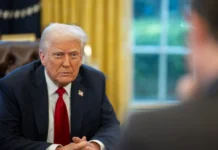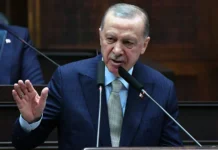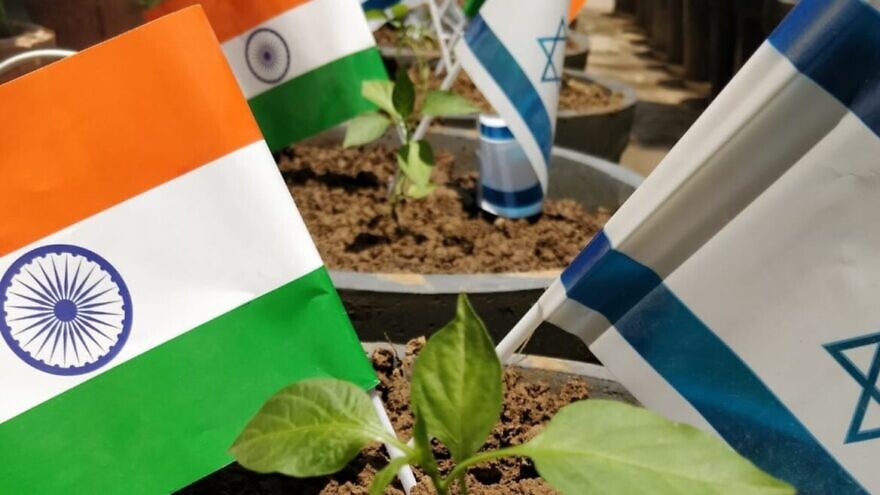India and Israel seem like a study in contrasts.
Some 1.4 billion Indians live in a vast country stretching nearly 3,000 kilometers (1,864 miles) across at its widest point, while 8.9 million Israelis live in a tiny land no more than 135 kilometers (85 miles) wide.
For starters, they nearly share a birthday. India gained independence from Great Britain in August 1947 and Israel in May 1948. And each has a proud history going back thousands of years.
“As I often say, we are two old nations in young countries, rich with history, culture and diversity, creatively overcoming challenges and eager to meet the future,” said Ambassador of Israel to India Naor Gilon.
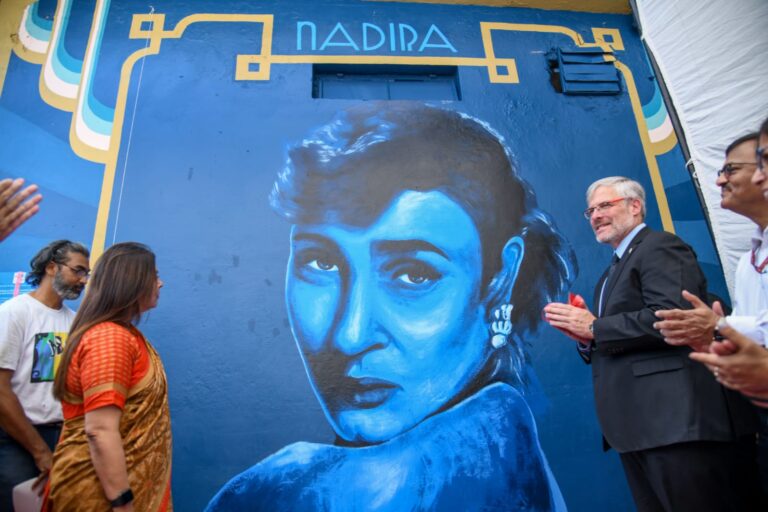
On Jan. 29, India and Israel celebrated 30 years of full diplomatic relations, kicking off a year of (mostly virtual) joint cultural and educational events.
The iconic Masada fortress in Israel, Gateway of India in Mumbai and Teen Murti Chowk in New Delhi lit up in 🇮🇳🇮🇱 colours on the occasion of #IndiaIsraelAt30 pic.twitter.com/e6445Q3WYp
— India in Israel (@indemtel) January 29, 2022
Israelis and Indians we spoke to agree that citizens of these two Asian countries have a strong affinity.
Indians admire Israelis’ straight-shooting, work-hard, play-hard mindset, vegan cuisine and TV shows like “Fauda.”
Israelis are such avid travelers to India (about 70,000 annually before the pandemic) that a typical itinerary there is dubbed “The Hummus Trail.”
Indian venture capitalist Saket Agarwal, who’s invested in more than 20 Israeli startups and VC funds, says Indians and Israelis both emphasize family and disdain structure.
Sharing these values “creates a lot of love between the two places,” says Agarwal, whose Onnivation Ventures matches Indian companies with disruptive Israeli technologies to solve problems and open new opportunities.
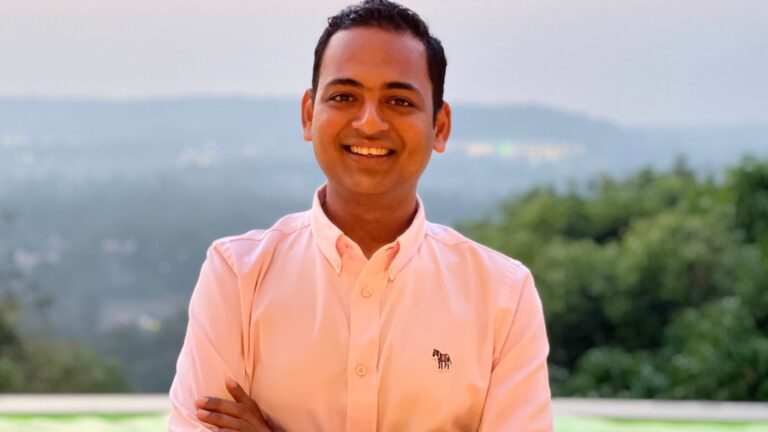
“Indians and Israelis like to break rules,” said Agarwal.
“We each have this whole chutzpah and tachles [bottom line] thing—we want to get stuff done and we always try to find a solution. We don’t give up. That mutual spirit of making it happen really works out.”
Indeed, India and Israel have active governmental, corporate and academic cooperation in fields including health, agriculture, water, trade, scientific research, security and technology.
Innovation and manufacturing synergy
In 2018, the two governments created the India-Israel Industrial R&D and Technological Innovation Fund (I4F), providing millions of dollars in funding for Indian and Israeli startups in water systems, agriculture, health, mobility and communications.
Over the past year, Israel’s Start-Up Nation Central and India’s iCreate incubator formed a partnership to accelerate innovation and technology cooperation.
“Israeli and Indian technologies matched with India’s manufacturing capabilities can provide innovative solutions contributing to the economies of both countries,” observed Gilon.
“There are many Israeli companies that are providing cutting-edge technologies and innovative solutions to vast projects in different Indian cities. Similarly, Israel has been an ideal place for Indian companies and entrepreneurs who are interested in finding partnerships with Israeli startups or R&D centers.”
Tel Aviv University and Thapar Institute of Engineering & Technology (TIET) in India—which already have a joint Center of Excellence in Food Security—plan to build a collaborative research center in advanced manufacturing for the biomedical, automotive, space and defense sectors.
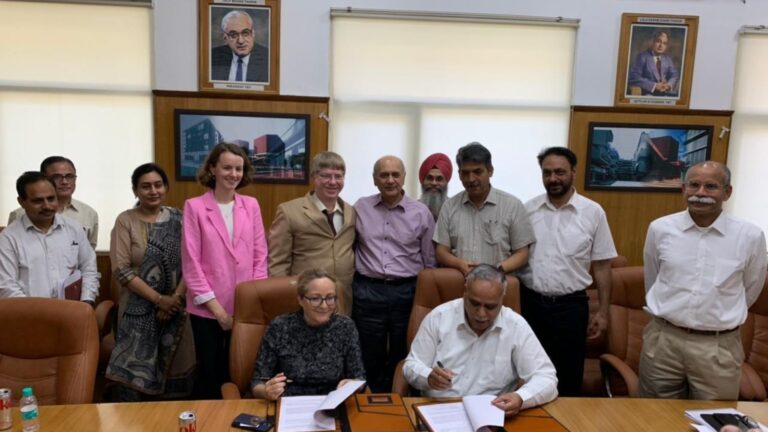
Automotive is shaping up as an area ripe for collaboration.
For instance, India’s Napino Group and Israel’s EVR Motors have agreed to develop (in Israel) and manufacture (in India) highly efficient, lightweight, compact motors for electric two-wheelers in India.
And Indian electric scooter maker Ola Electric made a multimillion-dollar investment in StoreDot, an Israeli developer of extreme fast-charging batteries, aimed at integrating StoreDot’s technology in Indian electric vehicles.
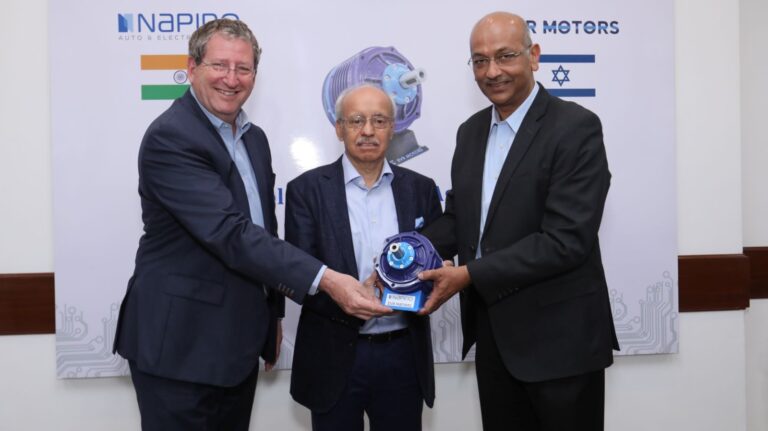
Gilon also noted that “since the beginning of the COVID-19 global pandemic, our countries have come together on a number of joint ventures” such as implementing Israeli AI-based technologies and medical equipment enabling Indian healthcare personnel to perform various tasks remotely.
Trade is brisk
In 1992, bilateral trade between India and Israel added up to $200 million (comprising mainly diamonds). In 2021, total bilateral exchanges of goods, diamonds and business services reached $6.3 billion, according to Joseph Avraham, Israel’s consul for trade and economic affairs in Bengaluru.
If we leave diamonds out of the picture (they’re not truly traded but rather sent back and forth for cutting and polishing), the overall figure totals $3.187 billion.
“India was the second leading export destination for Israel to Asia in 2021 and the seventh largest export destination for Israel in the world,” said Avraham. Make that sixth, if we count diamonds.
“Major export sectors from Israel to India were machinery and electrical equipment, chemical and chemical products, medical and optical equipment and base metals. Business services exports to India were $818 million in 2021,” he said.
“Major imports sectors to Israel were chemical and chemical products, base metals, rubber and plastics, food and agriculture. Business services imports from India to Israel were $150 million in 2021.”
Three Israeli trade missions are active in India—in Delhi, Mumbai and Bangalore—and the countries are negotiating a free trade agreement.
Mineral fuels, electrical machinery & organic chemicals are other key products exported from India to Israel!
Explore more about #IndiaIsraelRelations here: https://t.co/rqdixrXVr6#InvestIndia #InvestInIndia @indemtel @IsraeliPM @IsraelTradeIND pic.twitter.com/wPyJYQABGt
— Invest India – Israel (@InvestIndiaISR) February 15, 2022
Doing business
Indian-Israeli business ties are tighter than ever.
The India-Israel CEO Forum was formed just before Indian Prime Minister Narendra Modi’s visit to Israel in July 2017, and India’s ambassador to Israel, Sanjeev Singla, organizes annual meetings of the India Israel Management Committee and India-Israel Forum.
Happy 😃 2share- Doing business in 🇮🇳 is a course that I started to teach in @HaifaUni 🇮🇱.First lesson: Amitabh Bachchan @SrBachchan & Sachin Tendulkar @sachin_rt. One cannot understand 🇮🇳 without cricket 🏏 and Bollywood. @indemtel @IsraelinIndia @investindia @israelinMumbai pic.twitter.com/67LYyaHKeG
— Anat Bernstein-Reich (@BernsteinReich) February 22, 2022
Indian companies such as Jain Irrigation, Sun Pharma and State Bank of India are expanding their presence in Israel, while Israeli companies are building R&D centers and production plants in India.
Muhamed Heib, spokesman for the Israeli Embassy in New Delhi, said that trilateral cooperation among Israel, India and the United Arab Emirates is growing.
For instance, Ecoppia—an Israeli innovator of robotic technology for cleaning solar panels—will begin producing the robots in India with the support of the UAE.
“We also have the International Forum for Economic Cooperation encompassing Israel, India, the UAE and USA,” said Heib. “There is a lot of potential for trade and other cooperation among the four countries.”
Experts expect collaboration between Israel and India in the coming years to concentrate on cloud data, cybersecurity, alternative protein, digital health, smart transportation, smart city technologies and fintech.
“India is continuously building amazing consumer tech companies that focus on making the consumer journey better. Israelis can play a major role in supporting that with personalization, cybersecurity and analytics,” said Agarwal.
“In food-tech, Israel is doing amazing work on vegan meat and milk—I visited ReMilk when I was in Israel last time—so as the population of India grows, the shortage of meat production will make food tech even more important. We’ve been doing a lot of good work with Israeli companies and we’re looking to do much more.”
Water and agriculture
Heib says that agriculture and water projects are a major focus in this 30th anniversary year.
Since 2006, bilateral agriculture projects are implemented through the international development agencies of Israel’s Foreign Ministry and Ministry of Agriculture and Rural Development.
Indian agronomists often come to Israel for intensive training. And each year, about 140,000 Indian farmers come to 30 Centers of Excellence for Horticulture in 13 Indian states for training from Israeli experts on smart agriculture and drip irrigation.
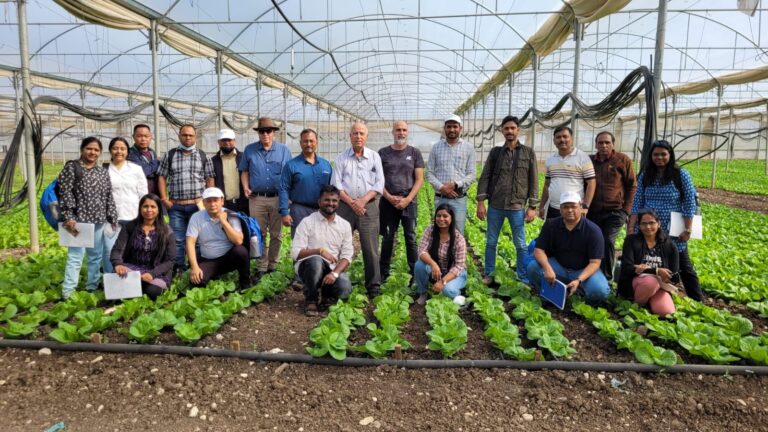
Yair Eshel, the current Israeli agricultural attaché to India, is expanding this initiative by creating Villages of Excellence.
“Instead of farmers coming to the centers, we send a trainer to 15 villages in each center,” said Heib.
Harshit Godha, who came to Israel to learn how to grow avocados commercially, eventually planted his orchard with Israeli-bred avocado plants.
“Greenhouse technology, drip irrigation, high-density orchards and optimal pruning techniques all came from Israel. Witnessing it firsthand changed my views about agriculture,” said Godha.
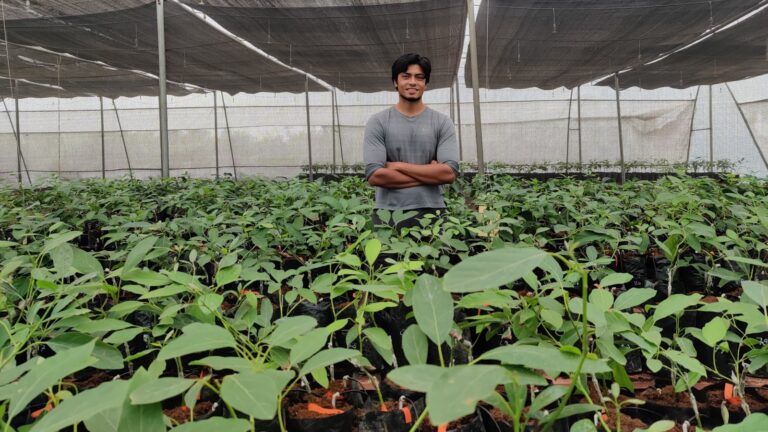
Veteran Israeli hydrologist Lior Asaf came to India last July as the very first Israeli water attaché to India.
“India has an abundance of water,” Heib explained, “but they have challenges in managing their water. Lior works with stakeholders to see where Israel can help. In the Bundelkhand region, for example, he is introducing a holistic approach from harvesting water to managing the whole system.”
People to people
Heib stresses that the person-to-person aspect is what drives Indian-Israeli cooperation in everything from business to culture.
The Indian Cultural Center in Tel Aviv, opened in January 2020, organizes events to promote cultural ties. In August 2020, India and Israel signed a three-year cultural exchange agreement.
Maestro Zubin Mehta dedicates a concert of the Israel Philharmonic #Orchestra to commemorate the 30th anniversary of 🇮🇳🇮🇱 relations. #IndiaIsraelAt30#IndiaIsraelfriendship#Music pic.twitter.com/I4yF3BAfvj
— India in Israel (@indemtel) February 26, 2022
Exposure to Indian culture is aided by the approximately 1,000 Indian graduate students studying in Israeli universities, by some 15,000 Indian citizens working in Israel, and by approximately 85,000 Israelis of Indian origin.
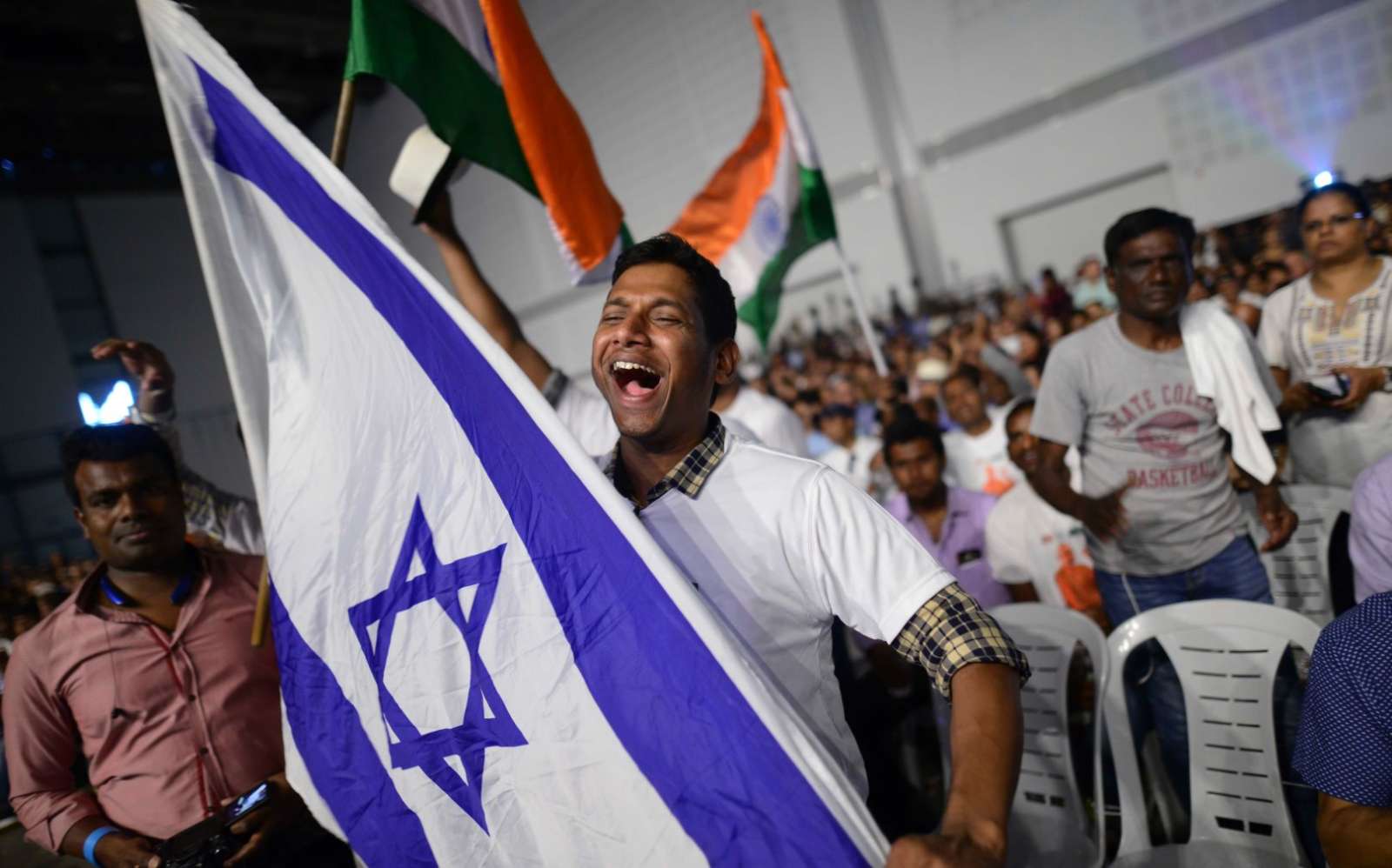
With the pandemic waning, Heib noted, “All the Israeli backpackers are coming back to India, big time. There are now three direct Air India flights per week and they’re quite full, so I hope they will introduce a fourth flight.”
The Peer lab rocking it at the #indiaweek @TelAvivUni ! pic.twitter.com/6EmipgC54n
— The Dan Peer Lab (@peer_lab) March 27, 2022
These young artists, tourists and students are a constant catalyst for warm relations between the countries.
“There’s a special connection between the two nations,” said Heib, an Arab Israeli from the Galilee. “It’s hard for me to express how much love and affection we have for each other. India has a large, young population so it will continue to be a strong strategic partner for Israel.”
This article was first published by Israel21c.

